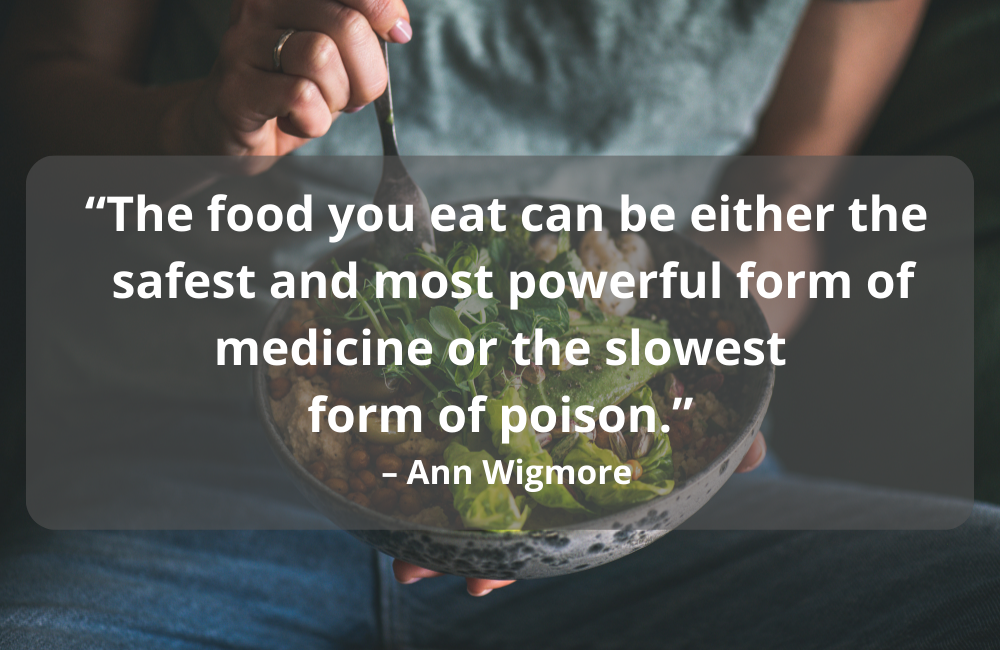First off, let’s talk about your diet. When you’re feeling burnt out and stressed, you might reach out to your comfort food, be it junk food, or sugary snacks. But soon after you start feeling guilty as it can be worse for your health. Many times, lack of energy and feeling depressed are often symptoms of some kind of vitamin deficiency. Eating junk or too many processed food items is also associated with hormonal imbalances, leading to sleep deprivation, bad mood and a lot more. Or when we’re dehydrated, we can feel tired, sluggish, and lacking in focus.
Staying hydrated and eating the right kind of food, the one that makes you feel good from the inside is what’s best for you. With the right nutrition, minerals, vitamins and antioxidants, your body can cope with stress easily and also boost energy levels. So start fixing your diet, incorporating good food and avoiding binge eating to cope with stress. Also don’t forget to drink enough water as drinking water regularly can help you not only stay hydrated but also avoid unnecessary snacking.
Sometimes, it’s better to steer clear of unnecessary conflicts and avoid engaging with people who are not open to healthy communication. Especially at your workplace, you’ll meet and engage every day with people who have different perspectives and opinions. But when it comes to dealing with people just bringing negativity is just not worth your time. It’s better to prioritize your own well-being and peace of mind, as being surrounded by toxic people can actually take a toll on your mental health. Their negative energy and behaviour can affect your mood, and self-esteem, leading to feelings of anxiety and stress.
Being exposed to such negativity can not just hamper your self-confidence but also worsen your mental health issues. Your mental health is often a reflection of your surroundings. So surround yourself with people who encourage you, inspire you, support you and provide a safe space for you to express yourself freely without fear of judgment. Avoiding toxic people is an act of self-care. So start prioritizing your mental health by choosing the company you keep wisely.
Engaging in any kind of physical activity is a great way to reduce stress and improve your mental health. Whether you decide to join a gym, go for a walk, or participate in any form of exercise, it can have tremendous benefits. Exercise releases endorphins, which are natural chemicals in our bodies that help boost our mood and promote a sense of well-being.
Exercise is not just about physical fitness or transformation; it plays a huge role in improving your mental well-being. It has a calming effect on our minds as it can help to release stress, reduce anxiety and promote relaxation. You can also get some fresh air and Vitamin D from the sunlight if you are exercising outdoors, which can have positive effects on your mood. So, whether you choose to join a gym or opt for outdoor activities, the important thing is to incorporate regular physical activity into your routine.
Meditation and mindfulness both are wonderful tools for reducing stress and improving bad mental health. They work great to quiet the mind, find peace and build self-awareness. If you are experiencing racing thoughts and anxiety from work-related stress, practising meditation can help you control that. It is a practice which if performed regularly can eliminate stress and enhance mental clarity. While being present at the moment or being mindful can help you develop the ability to observe and acknowledge your thoughts and emotions without being overwhelmed by them.
You can also incorporate meditation and mindfulness into your daily routine in various ways. It could be setting aside a specific time each day for meditation or engaging in brief mindfulness exercises throughout the day, such as taking mindful breaths, practising body scans, or savouring the present moment during daily activities.
There are plenty of resources available, including guided meditation online videos, and mindfulness courses that can help you get started or deepen your practice. Find what resonates with you and give it a try. Remember, consistency is key, so make it a regular part of your routine to experience the full benefits.
Work is a part of your life and not your whole life. It is important to discover your life purpose and engage in wholesome activities. Like indulging in hobbies or activities that you are passionate about can help you escape from daily pressures and bring a sense of joy and fulfilment. Whether it’s painting, dancing, playing an instrument, gardening, cooking, or any other activity that brings you happiness, hobbies provide an outlet for creativity and self-expression. They help divert your attention from stressors, promote relaxation, and boost your mood. By dedicating time to your hobbies, you prioritize self-care and create a positive balance in your life, improving overall mental well-being.
Believe it or not, getting enough quality sleep is a game-changer. When we’re well-rested, we’re better equipped to handle stress. You know those days when you’re sleep-deprived and everything seems to bother you? Yeah, that’s because lack of sleep messes with our emotions. Getting proper shut-eye helps us keep our cool and handle challenges more effectively.
Sleep is also like a brain booster. When we sleep well, our cognitive functions, like memory and decision-making, work at their best. It’s easier to concentrate, think clearly, and make smart choices. On the flip side, not getting enough sleep can make us feel fuzzy-headed and struggle with focus. And sleep isn’t just good for our minds, it’s good for our bodies too. When we snooze, our bodies repair and recharge. It helps keep our immune system strong and even helps with physical recovery.
Do you know what’s a surprisingly effective way to reduce stress? Doing nothing! It may sound counterintuitive, but sometimes giving yourself permission to do nothing can work wonders for your mental well-being. In our fast-paced, always-on-the-go world, we often feel the pressure to be constantly productive or busy. But guess what? It’s perfectly okay to take a break and simply do nothing. Giving yourself some downtime allows your mind and body to rest and recharge. It’s a chance to step away from the hustle and bustle of daily life and just be present in the moment.
You can sit back, breathe, and let your mind wander freely without any specific goals or tasks to accomplish. Doing nothing can help to quiet the mind and reduce the constant chatter of thoughts and worries. It’s like pressing the reset button for your mental state. By giving yourself this mental break, you may find that you gain clarity, perspective, and a sense of calm. Remember, in the midst of all the busyness, sometimes doing nothing is exactly what you need to find peace and reduce stress.












































































